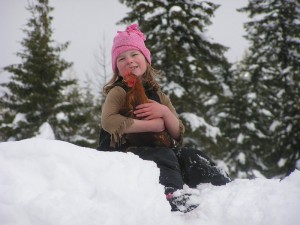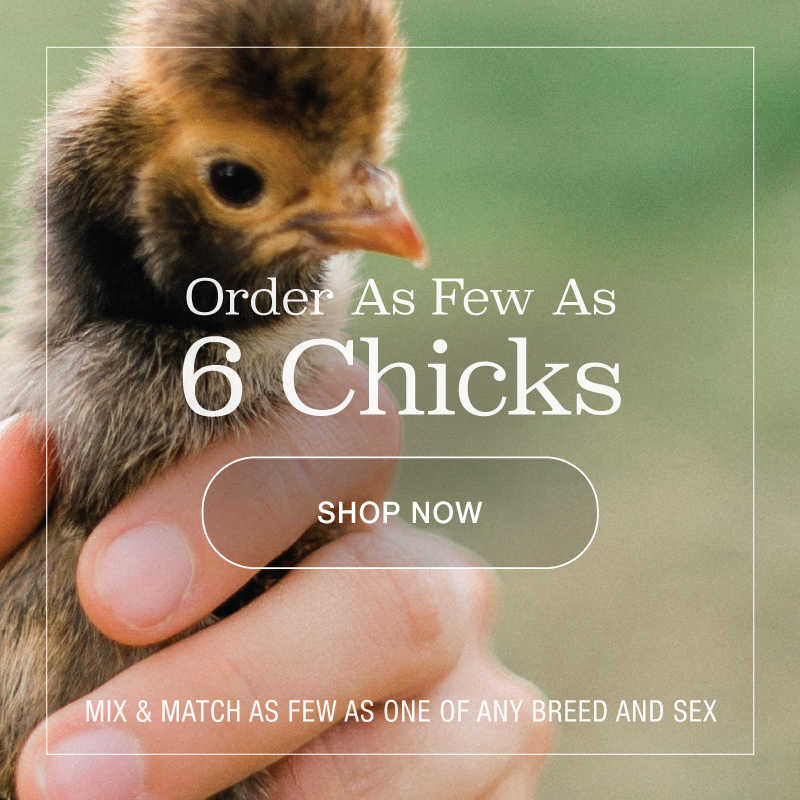[This is the second part of a two part article. If you missed part 1, you can read it at: Preparing your Laying Flock for Winter, Part 1.]
Water Supply
Water is important to chickens in cold weather just as it is in hot weather. Be sure that your chickens always have a supply of clean drinking water. When temperatures drop below freezing, this can be a challenge because the water in the chicken waterers begins to freeze. To overcome this problem, you can buy a heated waterer or a heated waterer base, or you can setup some way to keep your existing waterers warm.
Eggs
To prevent your chicken eggs from freezing you may have to gather them several times a day.
Feed
If your chickens rely on forage for some or all of their daily food, you need to plan for the fact that there will be less forage for them to eat in the winter. In cold weather, chickens may consume more food because they depend on the heat that they can produce from the food to stay warm. It is important to make sure that they have enough food available throughout the day, and you may want to supplement their usual feed with some scratch grain, high in carbohydrates, which the chickens can convert to heat to stay warm.
Lighting
If you do all the things mentioned above, it will help your flock stay in good health through the winter, but egg production will still decline because days are shorter, and there are fewer daylight hours.
If you want to keep your flock laying well through the shorter winter days, you will need to add artificial lighting in the early morning to give them a total of 14-16 hours of daylight. One way to do this is with an outlet timer and a drop light, setting the timer so that the light bulb comes on before dawn to give the correct number of hours of light.
Safety
We strongly recommend that you not use any open flames to heat the coop because of the possible fire hazard. Avoid kerosene and oil lanterns, candles, gas heaters, and anything else that uses a flame for heat.
Light bulbs can be used, but they do get hot, so secure them thoroughly, and make sure that there is ample room between bulbs and combustible surfaces like wood, tarps, and bedding. Heat lamp bulbs put off considerable heat and must have sufficient clearance from combustible materials.
Check the temperature of nearby combustible surfaces periodically with your hand. If any surface is too hot too comfortably hold your hand on it, then there is a possible fire hazard that you should correct.
Extension cords pose another safety hazard. Follow manufacturers’ directions, only use cords that are in good condition and rated for outdoor use, and be sure that you do not exceed the electrical rating of the cords. Make sure that extension cord connections are protected from wet weather and other water sources.
It is always a good idea to keep a hose nearby and ready for use in case of fire. Hoses can freeze easily when you’re not actively running water through them, and that makes them useless when you need them, so drain the water out of your hoses after you use them.
Coop Door Controller
A great way to simplify the need for lighting and improve nighttime temperature control while protecting your flock against nighttime predators is our Electronic Chicken Coop Door Controller.
It automatically opens the coop door at dawn and closes it at dusk, using a light sensor. It senses the air temperature, and if the temperature is below 20° F, it keeps the door shut to avoid exposing the chickens to cold temperatures and to keep the inside of the coop warmer. It also turns on a light before dawn to give the chickens 16 hours of light each day. The light uses LEDs and generates negligible heat, so it does not create a fire hazard.




If you had a choice, either Buff Orpingtons, Silver Laced Wyandottes, or Barred Rocks, which one would you chose for the best winter-hardiness, egg laying during the winter, and meat bird?
Thanks!
I built a 30×12 greenhouse (for my wife) on the back of my house, which of course had to be heated. When the temp is below 40° I turn the heat on, and to my surprise this costs me no more than before. She passed, so I converted 20 ft to a chicken house. Plastic panels w/8″ dead air space for roof and 6″ dead air space between salvaged glass panels for walls. Sliding glass doors on both N & S walls, and French doors that open onto a deck inside from the dining room, where I store their feed and my tools (10 x 12 area). Chicken wire separates the 2 areas. I cut a small pine tree, anchored top an bottom,which they roost upon. The floor of coop area is salvaged sheet metal (has to be cleaned daily), and spread w/straw. They love scratching through it. Roosters are prohibited (the hen’s idea), they roost just outside the door. Hens (6 ea. Araucanas and Black Stars) don’t care to go outside when raining or snow is on the ground unless chased out. They keep me occupied, entertained, provide me & a few others with eggs, and I butcher roosters (have 8 now). Use a work light in the winter and last week my 12 hens lay 12 eggs twice! Use the straw and scrapings as compost for my terraced gardens (under construction). They free range when outside but must be enclosed at night due to foxes and raccoons around. All in all, an enjoyable (usually) hobby/enterprise. I have an incubator and have 12 – 8mo. old chicks. May hatch more this spring.
I have been raising chickens now for about 40 years, and it seems that there is always something new to learn about. I think one of the best winter hints, is using very warm water for them . I usually get double the eggs the next day afterward when they are getting it. Also deep shaving for bedding, not less than 6-8 inches. When the winter sun comes shining in the windows, they are sunbathing in the shavings, and doing dust baths. Another helpful hint that works wonders for diseases of the gut is just sprinkles of garlic powder in their water. They seem to love it , and their health really shows it!
Help Help! We have feathers all around, low laying and a general pecked over look going on. The birds have been fine in the same environment now for a couple of years, and now it’s not lookin’ too good. Otherwise the birds seem healthy, but something is going on. Any suggestions? Is there a ground spray of some kind (even a home remedy) that we could spray the area they are in safely? Prior to us, there were dogs that lived in that same space for a number of years, as I said all has been well but….maybe that could help????
thanks
I am really enjoying my first mixed flock of chickens. The only problem I have experienced is I have a cuckoo Muran and now a Byff Orpington setting. I figured the cuckoo would give up after a couple of weeks with no eggs. I take her off the nest carry her a ways from the coop. I have locked her in a small pen that I use as a medical bay. She became very frantic, and after a day I let her out. Now I have the Buff joining her. I have 26 hens 3 roosters and they are six months old. Suggestions anyone?
I am new with poultry and peafowl. I appreciate all information and upcoming winter prep. I hope to purchase more birds soon.
Gail Lolbrook
Corbin, KY
I bed my chicken coops heavily in pine shavings. Same stuff as I use to bed my horse’s stalls. Easy to pick out daily with a manure fork.
I have Rhode Island Reds, Sexlinks & 4 others that I have never been able to identify but they are absolutely beautiful birds. My one Red is three yrs old now & lays my largest eggs. I got an egg that measured 2 & 1/2 by 1 & 3/4 this morning! I feed my chickens a mix of cracked corn & layer feed & I double the amount I make available to them in the winter. I have a fenced 3 acre parcel for them to run around on. I use wood shavings that I buy at the local Tractor Supply store to line the coop & nesting boxes & it really seems to help with keeping odors down & when I clean out the coop it all goes into my garden area because it will all degrade.
I am a first-time flock owner. I would like to know more about feeding the “oatmeal” to my chickens to encourage winter egg production. I would also like to know what is the ideal temp to keep my coop through the winter months.
Kara, chickens lay best when the air temperature is above 55° F. They can handle temperatures colder than that, but their rate of egg laying will be lower at colder temperatures.
Wyandottes and Americanas are cold hardy and lay very well even in the coldest climates. Personally I think the Blue-laced red Wyandottes are beautiful.
I have 5 Blue Laced Red Wyandotte hens and just love them. I want to get a few more hens and maybe a rooster too. I love the color of them.
Why do silkie birds have eye problems during the winter months when housed in the same building but a different part than regular laying birds? They are seperated by chicken wire. They seem to constantly develop eye infections? Just Wondering?
Winter hardy chickens: Chanteclers. Beautiful birds with great temperament. Also Buckeyes are bred for cold climates. These birds need help as I believe they are on the endangered species list. I have a flock of both and do not have any winter problems. Just be responsible for providing enough dry bedding.
Great information for new and us old chicken keepers! Which breed of chicken would you recommend for winter-hardiness and/or good egg production throughout the winter months? Thank you.
Rhode Island Reds work well.
I lived in Utah for several years and found that the Brahmas were really good at keeping up with laying during winter (I even had one decide to hatch out some eggs in January!). The pea comb is small and close to the body as well as having built in “leg warmers”. :)
One thing that I honestly believed helped to improve laying in the winter would be to give them “oatmeal” in the morning. I would take whole oats and add boiling water. I would then cover them and let it sit until it cooled down. Otherwise they could have burned themselves. Once I started to do this my egg production went up some.
I’ve also heard that Black Australorps are good for cold weather.
what is the best bedding to use on coop floor, to ensure chickens are warm enough?
SAW DUST shavings work well for floor @ bedding no saw dust